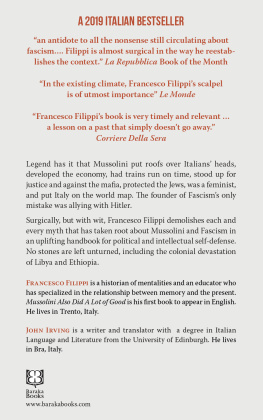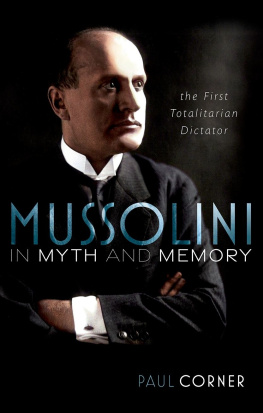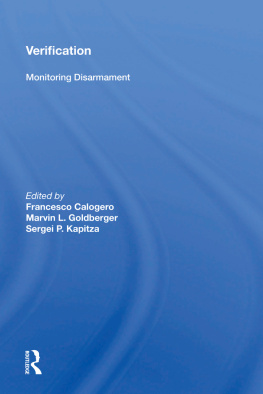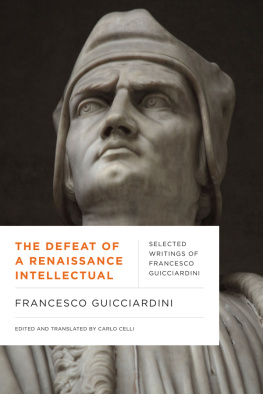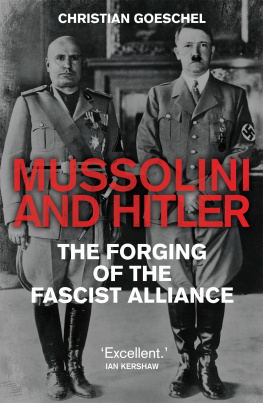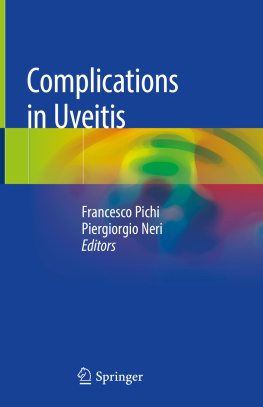Francesco Filippi - Mussolini Also Did a Lot of Good
Here you can read online Francesco Filippi - Mussolini Also Did a Lot of Good full text of the book (entire story) in english for free. Download pdf and epub, get meaning, cover and reviews about this ebook. publisher: Baraka Books, genre: Politics. Description of the work, (preface) as well as reviews are available. Best literature library LitArk.com created for fans of good reading and offers a wide selection of genres:
Romance novel
Science fiction
Adventure
Detective
Science
History
Home and family
Prose
Art
Politics
Computer
Non-fiction
Religion
Business
Children
Humor
Choose a favorite category and find really read worthwhile books. Enjoy immersion in the world of imagination, feel the emotions of the characters or learn something new for yourself, make an fascinating discovery.
- Book:Mussolini Also Did a Lot of Good
- Author:
- Publisher:Baraka Books
- Genre:
- Rating:4 / 5
- Favourites:Add to favourites
- Your mark:
- 80
- 1
- 2
- 3
- 4
- 5
Mussolini Also Did a Lot of Good: summary, description and annotation
We offer to read an annotation, description, summary or preface (depends on what the author of the book "Mussolini Also Did a Lot of Good" wrote himself). If you haven't found the necessary information about the book — write in the comments, we will try to find it.
Mussolini Also Did a Lot of Good — read online for free the complete book (whole text) full work
Below is the text of the book, divided by pages. System saving the place of the last page read, allows you to conveniently read the book "Mussolini Also Did a Lot of Good" online for free, without having to search again every time where you left off. Put a bookmark, and you can go to the page where you finished reading at any time.
Font size:
Interval:
Bookmark:
To my wife, Cristina,
who has been waiting for this book
for even longer than I have.
Pensions are one of the pet subjects of those who look back with nostalgia to the Fascist period, publicly and virtually. The idea, still comparatively widespread, is that having taken power, it was Mussolini who built the Italian welfare system and gave everyone the chance to enjoy their old age serenely through a modern system of social security contributions. In addition to the pension system, the Fascist state is also said to have activated the principal forms of social welfare and regulation of working conditions. This complex system, worthy of a regime attentive to the needs of its citizens, allegedly gave Italians workplace security and the right to decent old-age pensions.
He provided all Italians
with free welfare!
Pensionsor, better still, the welfare system for old-age and sickness benefitswere actually a German invention, which made their first appearance thanks to Chancellor Otto von Bismarck. The law on old age and invalidity insurance was introduced in the German Empire in 1888: it was a system that, on payment of contributions, entrusted the state with taking economic care of those workers who, for reasons of old age or infirmity, had become unfit for work. This veritable social revolution subsequently spread across the rest of industrialized Europe.
It was the Francesco Crispi guaranteeing insurance coverage for a number of professional categories. At the same time, the National Workers Invalidity and Retirement Fund (Cassa nazionale di Previdenza per linvalidit e la vecchiaia degli operai) was set up to manage contributions and provide welfare services for workers.
At first, the system was voluntary, supported by the state with incentives to the companies that adhered to it. Thanks, above all, to the struggles of the Italian trade unions, it soon spread to the countrys most important blue-collar categories.
When World War I broke out, a series of welfare provisions was thus provided for civil servants, soldiers and factory workers. The labour unrest and the risk of a drift to revolution provoked by the conflict obliged the government to promise further reforms in order to maintain social peace and sustain the war effort. With the war over, a new set of social reforms introduced further protections in 1919.
The pension sector was reformed radically: the old Invalidity and Retirement Fund became the National Social Insurance Fund (Cassa Nazionale per le Assicurazioni Sociali), adherence to the system was made compulsory for employers, and trade union representatives were allowed to sit on the bodys board of directors. The change in the Funds name suggested that guaranteed protection was no longer to be a benefit for the individual worker but was to be extended to society as a whole. From that moment onfrom 1919, that isall Italian workers were entitled to a pension by law.
The nucleus of social security in Italy, put in place within the framework of reforms implemented by Francesco Crispis Historical Left, was subsequently developed as a system of universal security by Vittorio Emanuele Orlandos Liberal government.
After conquering power, Mussolini at once undertook to take control of this vital sector of the state apparatus. The first change to the system as a wholethe abolition of Ministry of Labor and Welfareordered by the Royal Decree of April 27, 1923
At that time, the Fund was still essentially a financial institution. Its main duties were the collection of insured workers premiums and the distribution of pension benefits. When he took control, Mussolini began to supplement the Funds original services, such as invalidity and old age coverage for specific professional categories and social protection, with many of the ones previously provided by professional social security and welfare structures. In 1924, for example, the job of managing involuntary unemployment insurance was assigned to the Fund,
The precise purpose of taking over management duties was to centralize in a single body, directly controllable by the executive, the many forms of social care and security that had sprung up over the years alongside public welfare structures. The clear aim was to control any form of social assistance, de facto placing benefits under the aegis of the state, meaning the Fascist Party. The Fund was changing its original function by concentrating all the public interventions that we would now refer to as welfare. Fascism thus merely limited itself to amalgamating what existed in Italy already.
These maneuvers were not accompanied by a concomitant expansion of the structures of the Fund, which struggled initially to cope with its new duties. Albeit now domesticated, the board of directors signalled this lack of balance on more than one occasion, and even complained to the government about it. Paradoxically, Fascisms first social security provisions weighed down the system and made it progressively inefficient. Instead of improving it, the reforms had the sole aim of subduing it and enabling the highest authorities to control it directly.
Mussolini gave us pensions!
Appropriation of social security structures reached its climax in 1933 when the Fascist regime decided to make a blanket reform of the Fund as a whole. The most visibleand significanteffect of the reform was another change: the Cassa Nazionale, or National Fund, became the Fascist National Insurance Institute (Istituto Nazionale Fascista della Previdenza Sociale), whose unpronounceable acronym was INFPS. Adding the term Fascist was a propagandistic attempt to take over what was actually the fruit of decades of trade union bargaining and struggles, of reforms enacted by Liberal governments, and of the initiatives of professional labor associations.
In addition to the change in name, amendments were made to the social security machines setup. The structure of the Institute, which had grown into one of the largest government bodies of the time, was verticalized by concentrating in the presidents hands prerogatives and responsibilities that had previously been spread over organs of administration such as the board of directors. As is easily imaginable, the appointment of this new super-president was made directly by the head of government, Benito Mussolini himself.
The Fascists did not invent social security in Italy with this crucial reform, they simply took it over. Once they had occupied this portion of the public sector permanently, the regime turned INFPS into a great payer of wages: in 1941, the number of direct employees reached 8,000, making the Institute the second largest public employer in Italy.
In the course of time, employees in secure well-paid jobs were joined by a mass of professionals, temporary employees and workers. On paper, they were supposed to act as a stopgap in performing the bodys many extraordinary functions but, in reality, became a stable source of consensus for the regime. When membership of the Fascist Party was made compulsory to hold public office, a great many people rushed to apply for jobsif need be, temporaryas social security personnel.
To regulate this onslaught by loyal Fascists, real or professed, a special law even had to be passed: Law no. 782 of May 29, 1939, in fact, eloquently entitled Temporary employment of members of Fascist action squads
At the same time, the Institute became a veritable night safe from which the regime plundered extraordinary funds and contributions for the most diverse purposes, including land reclamation consortia, extraordinary provisions and state-controlled welfare agencies close to the regime. These were just a few of the thousand streams into which trickled money collected from workers contributions and which was spent for purposes other than institutional ones. When the Fascist regime entered the war, it marked the coup de grce for the coffers of the Institute. It found itself having to process the claims for compensation from invalids and widows of soldiers at the front, while its offices became a safe haven for those seeking to shirk military service and the draft.
Font size:
Interval:
Bookmark:
Similar books «Mussolini Also Did a Lot of Good»
Look at similar books to Mussolini Also Did a Lot of Good. We have selected literature similar in name and meaning in the hope of providing readers with more options to find new, interesting, not yet read works.
Discussion, reviews of the book Mussolini Also Did a Lot of Good and just readers' own opinions. Leave your comments, write what you think about the work, its meaning or the main characters. Specify what exactly you liked and what you didn't like, and why you think so.

